Some notes when your baby is teething. We will discuss the signs and symptoms of teething, the typical teething timeline, and provide some helpful advice to help you manage this condition best for your child. Bedental will share some notes on teething in the following article, so let’s find out more!
I. Some notes when your baby is teething
Notes when your baby is teething: Understanding the teething process can help parents better prepare for their child’s development and manage any discomfort effectively.
1.1 When do babies start teething? Baby’s teething schedule
The molars are the largest teeth on the jaw and play a role in chewing and grinding food. Babies start teething when they have stopped bottle-feeding, breastfeeding, and transitioned to eating solid foods.
Baby’s teething schedule: The specific timing of a baby’s teething is as follows:
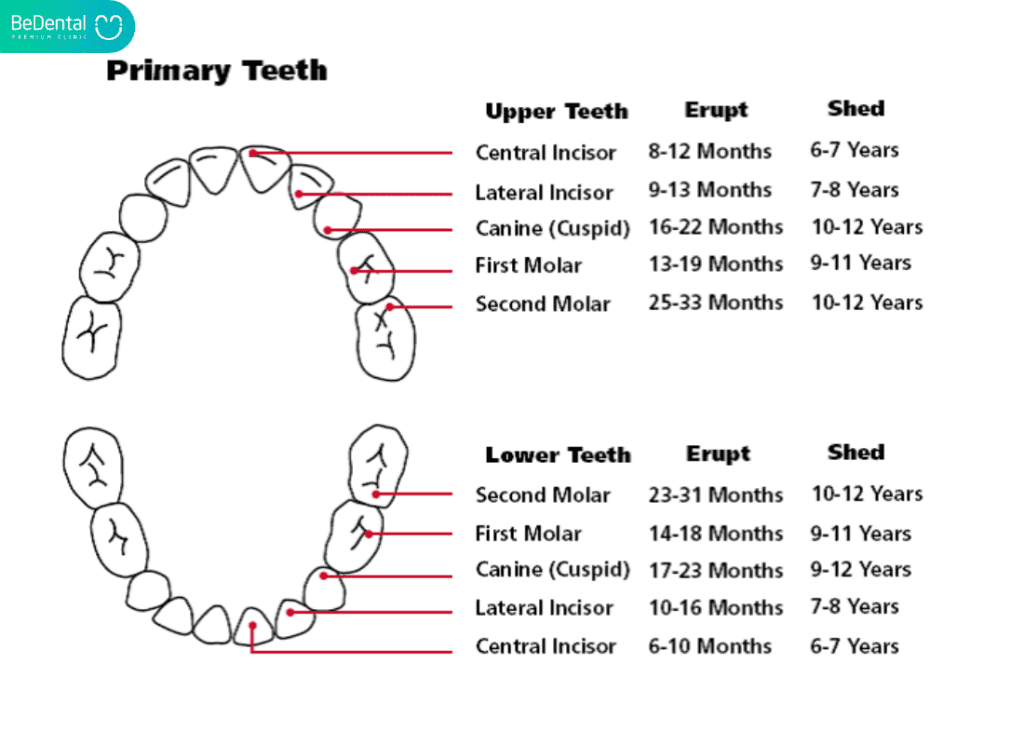
See more: Remove wisdom teeth
1.2 Which teeth do babies first start teething with?
- The first set of primary molars (first molars, also known as baby teeth number 4): typically appear when the child is around 13-19 months old.
- The second set of primary molars (second molars, baby teeth number 5): usually emerge when the child is 23-33 months old.
- The first permanent molars (permanent teeth number 6): generally come in around 6-7 years old.
- The second permanent molars (permanent teeth number 7): typically erupt between 11-13 years old.
- The third permanent molars (wisdom teeth, permanent teeth number 8): usually develop between the ages of 17-25.
Notes when your baby is teething: While these ages are general guidelines, every child is unique, and some may experience teething earlier or later than others.
According to the above list of baby’s teething age, the child’s first molars are teeth number 4. Typically, the upper first molars (teeth number 4) will emerge around 13-19 months old, followed by the lower first molars (teeth number 4) at around 14-18 months old. The eruption of the second molars will occur a few months later, but it is often less painful and more comfortable than the first molars.
1.3 Notes when your baby is teething – Is it normal for a child to have upper teeth come in first?
The timing of tooth development is generally expected to follow a pattern where the upper teeth come in first, followed by the lower teeth. However, in reality, a child’s teeth can erupt in different sequences. They may have the lower teeth come in first, have a mix of upper and lower teeth erupt simultaneously, or have both upper and lower teeth come in at the same time.
Notes when your baby is teething: If your child’s teething pattern differs from others, it is usually nothing to worry about unless other dental issues arise.
The eruption of a child’s teeth does not follow a fixed rule. Therefore, if a child’s upper teeth come in first, it is completely normal, and there is no need to worry.
1.4 What should be done if a child’s molars come in before the canines and incisors?
According to the natural order of tooth eruption, molars typically come in after the canines and incisors. If a child’s molars come in before the canines or incisors, it is considered an abnormal occurrence. If the child’s molars erupt before the canines and incisors, it can disrupt the alignment of the teeth, causing them to be misaligned or fractured.
See more: do baby canines eruption change
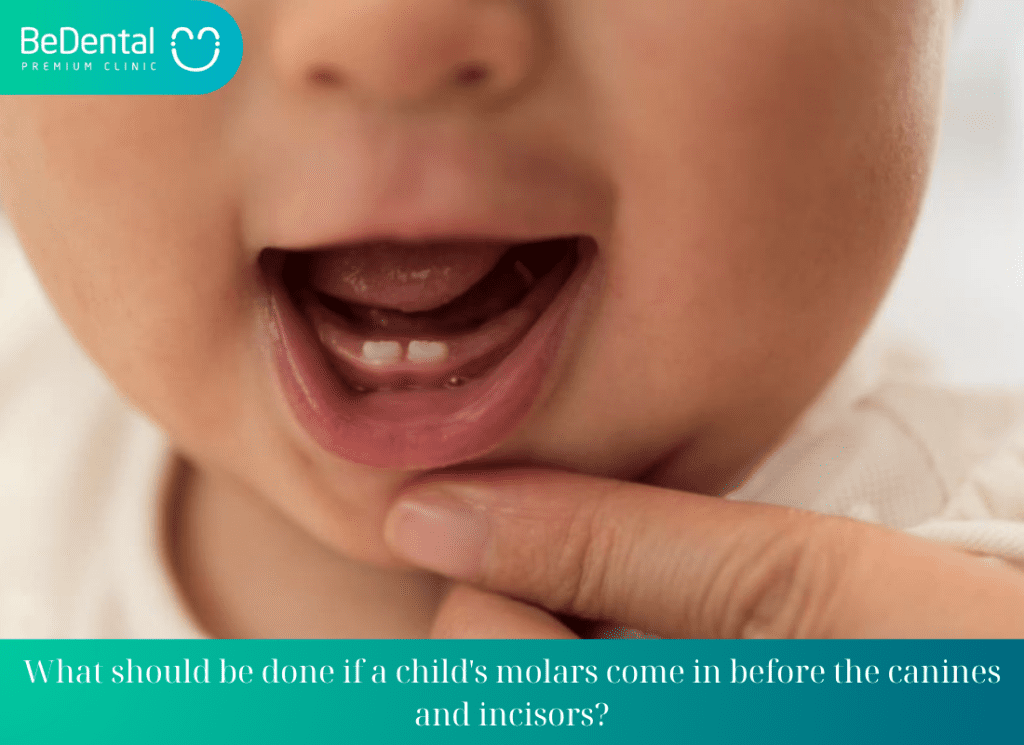
Some notes when your baby is teething: Regular dental check-ups can help ensure that your child’s teeth are developing correctly.
In such cases, it is important to take your child to a dentist to monitor the development of their teeth and intervene promptly (if the canines and incisors are not present or are erupting in an abnormal or misaligned manner).
1.5 Does early teething in children have any impact?
There are several reasons why children may experience early or delayed teething, such as calcium deficiency/excess, maternal diet during pregnancy, genetic changes, and more.
Notes when your baby is teething: If early teething is accompanied by other unusual symptoms, consulting a dentist is advisable.
Therefore, if you notice signs of early teething in your child, there is no need to worry. Simply ensure proper care and hygiene to prevent early tooth decay in primary teeth.
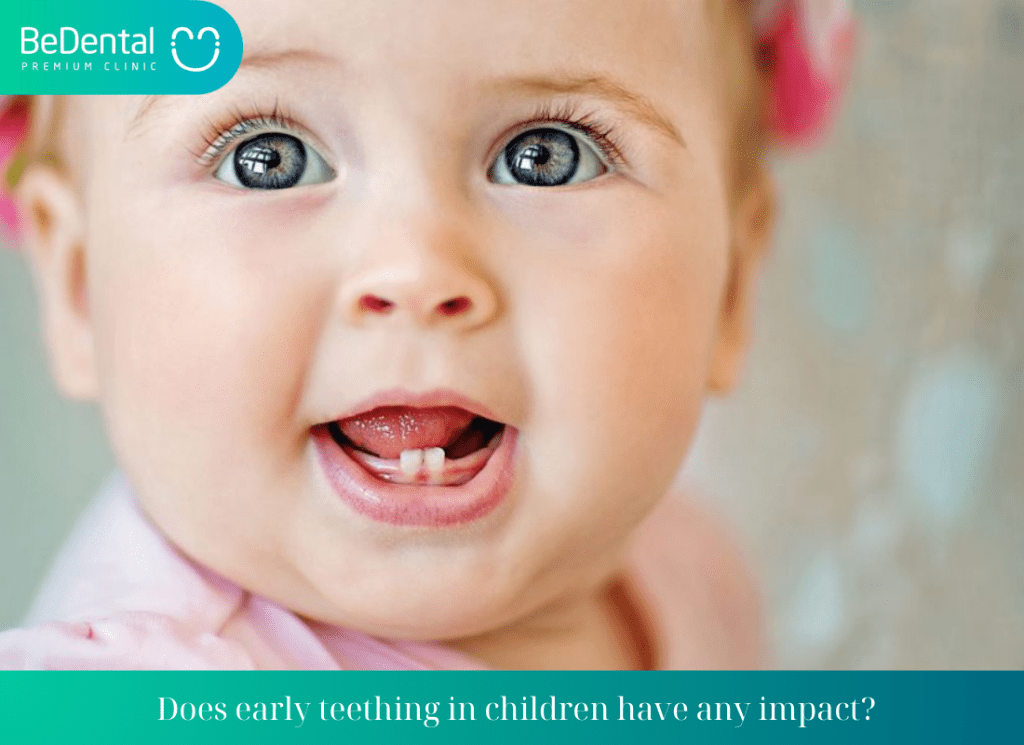
Early tooth extraction can actually help children develop better chewing skills and provide necessary nutrients to their bodies without negatively affecting their overall health or well-being.
1.6 Do babies experience pain when teething?
Molars are relatively larger teeth and less firm, so when babies are teething, it can be more painful compared to other teeth. Some children with weaker immune systems may also experience additional symptoms such as high fever, fatigue, loss of appetite, or rashes.
Notes when your baby is teething: Keeping your child comfortable with soothing remedies can make the process easier.
However, many babies can go through teething without experiencing significant pain due to their strong overall health, sturdy and sharp teeth capable of breaking through the gum tissue.
Therefore, it is important for parents to be aware of the care routine, dietary considerations, and methods to alleviate teething discomfort, ensuring a gentle and soothing teething process.
See more: What are dimples? How to have dimples?
II. How long does it take for molars to come in?
How long does it take for molars to come in? Parents should be aware of the timeframes for molar eruption in order to monitor and adjust the child’s diet accordingly. The eruption of molars, from the fourth molar to the eighth molar, occurs throughout the child’s developmental process (typically from around 13 months old to 25 years old).
Notes when your baby is teething: The molar eruption timeline varies among children, but monitoring their progress helps in planning their diet and oral care.
In some special cases, the eighth molar may not erupt until the age of 30 or even longer. The typical process of molar eruption takes about eight days, with four days before and four days after the tooth passes through the gums.
It takes several months for a molar to fully form. Specifically, the eruption of the eighth molar may take only a month to surface a few times, and the completion of molar eruption may take several years.
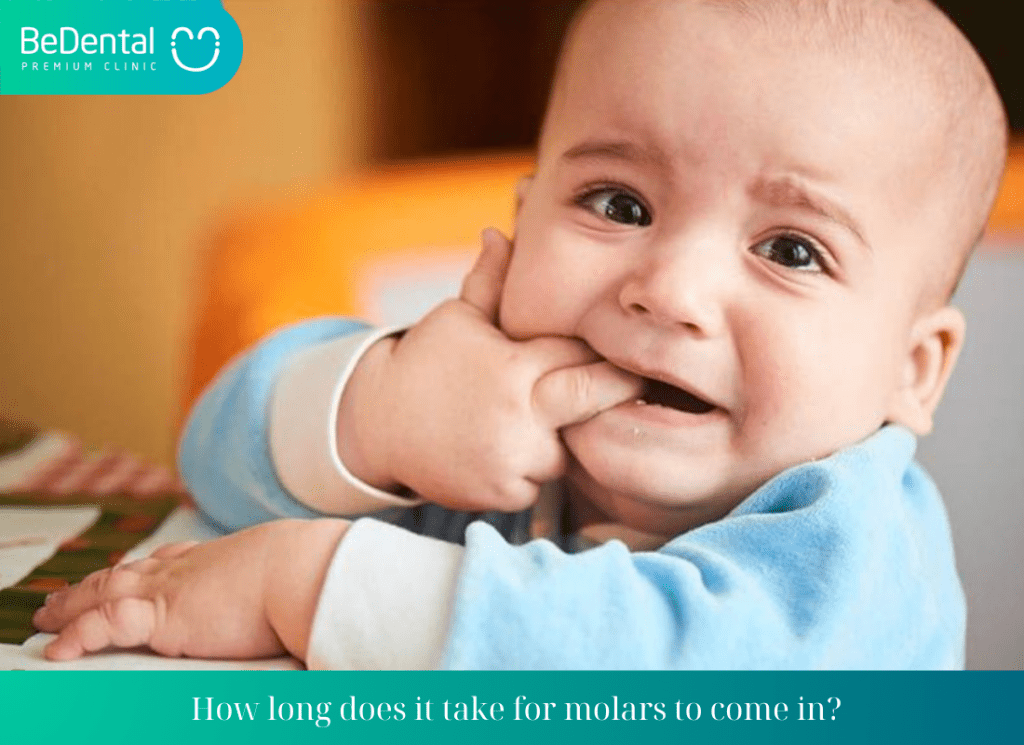
III. What are the signs of teething in children?
What are the signs of teething in children? Let’s find out together!
3.1 Signs of teething in children: Fever during teething
It is normal for children to experience a fever while teething. If a child has a fever of 38 degrees Celsius or 38.5 degrees Celsius, you can use a lukewarm cloth and place it on the child’s face or wipe their body to provide some comfort.
Notes when your baby is teething: A mild fever is common during teething, but if it becomes severe, seek medical advice.
If you decide to use fever-reducing medication, it is important to consult a doctor and seek their advice. Do not prescribe medication on your own.

See more: HOW MUCH DOES IT COST TO REMOVE WISDOM TEETH? 3 REASONS TO REMOVE YOUR WISDOM TEETH
3.2. Signs of teething in children: Swollen gums during teething
When the teeth start protruding through the gumline, it can cause swelling in the gum area. The affected area may feel tight, tender, and appear red compared to the rest of the gums. This inflammation of the gums during teething typically lasts for about 3-5 days and then subsides. It is a natural reaction of the body, and parents do not need to worry.
3.3 Signs of teething in children: Foul breath during teething
In cases where a child’s gums become swollen and pus-filled after the teeth have broken through the gumline, food particles can get trapped. If not properly addressed, this can become a breeding ground for bacteria, leading to inflammation and bad breath in the child.
3.4 Signs of teething in children: Refusal to eat during teething
Children at the teething stage often experience fussiness, irritability, and a decreased appetite. Therefore, parents should offer small and frequent meals to the child, prepare delicious and nutritionally balanced foods, and employ techniques to stimulate the child’s eating abilities. This will help the child navigate this stage effectively.
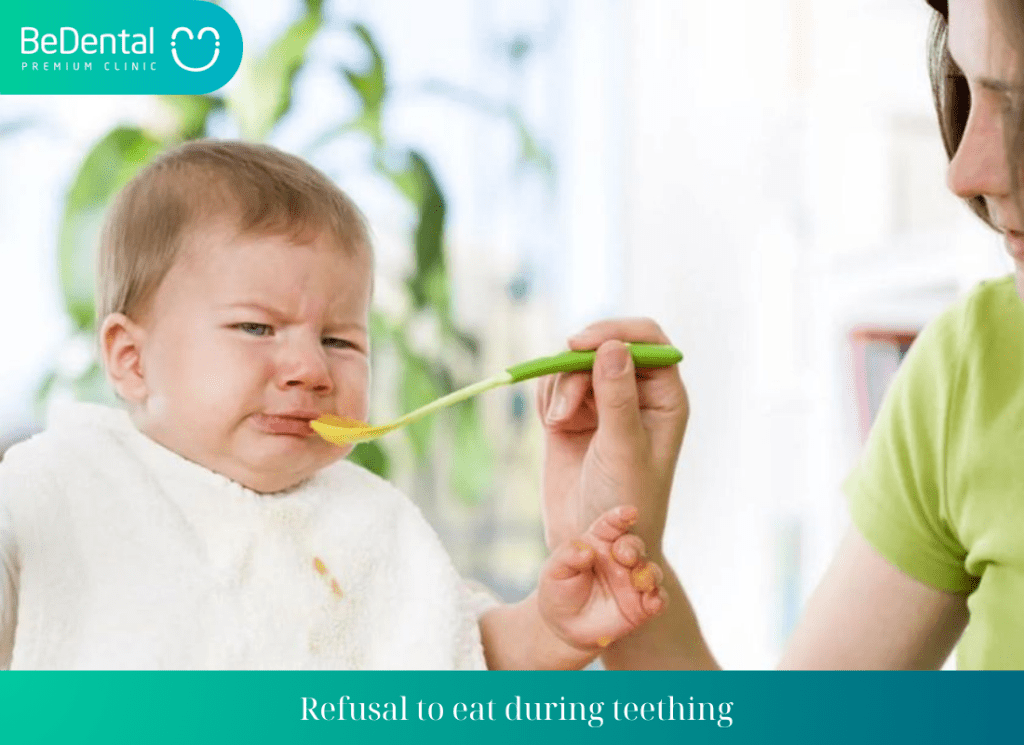
3.5 Signs of teething in children: Can teething cause diarrhea in children?
Common symptoms in children, such as disrupted sleep and eating patterns, irritability, rashes, sweating, runny nose, and diarrhea, can be indirectly related to teething.
If a child experiences prolonged high fever and diarrhea while teething, it may indicate other underlying conditions such as fungal or viral infections, or an issue with the middle ear.
Therefore, to determine if teething is causing diarrhea in a child, it is important for parents to consult a doctor or seek a direct medical examination to receive appropriate advice.
IV. Ways to alleviate teething pain in babies
Ways to alleviate teething pain in babies – During the teething phase, babies can experience significant discomfort. To help alleviate some of the pain, you can try the following methods:
- Use a clean finger or a soft, damp cloth that has been sterilized to gently massage the baby’s gums.
Note: Ensure that any objects introduced into the baby’s mouth are properly sterilized with saltwater or non-toxic cleaning agents to avoid bacterial infections that may affect the baby’s health.
See more: Signs of crooked tooth growing? How to have crooked tooth?
- Massage the gums to reduce pain when the baby is teething.
- Allow the baby to use sugar-free teething biscuits or specialized teething toys. However, these should only be used when the baby is over six months old and has started chewing on harder foods.
- Use pain relief medication such as paracetamol, which is beneficial for children. Ibuprofen or toothache relief gels containing choline salicylate can also be effective, but caution should be exercised as they may have unwanted effects on children.
- Regularly wipe the skin around the teeth, especially the chin area, if the baby is drooling excessively.
- Supplement the baby’s diet with vitamin D and calcium to promote strong and healthy teeth, and gently brush the teeth to reduce pain.
- Maintain regular oral hygiene for the baby to prevent bacterial tooth decay and infections during the teething period.
- Schedule regular dental check-ups every six months to monitor the baby’s dental development and address any oral health issues early on.
If you have any specific concerns or need detailed advice regarding your current situation, especially regarding notes when your baby is teething, you can contact the dental team at BeDental for professional guidance and assistance
Tư vấn chuyên môn bài viết:
BÁC SĨ DƯƠNG THỊ THÙY NGA





